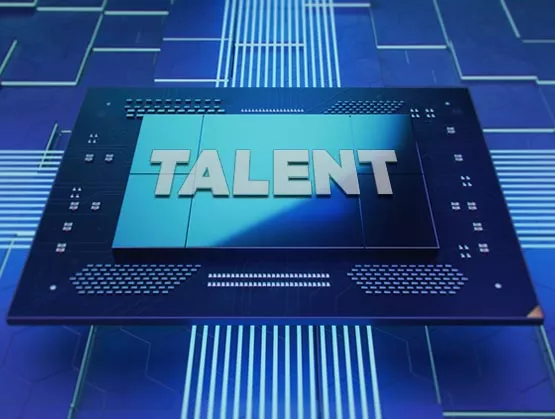
According to the Korea Semiconductor Industry Association, Korea’s semiconductor workforce numbered nearly 180,000 in 2021 but is expected to surge 68% to 304,000 in 2031 to help meet exploding global demand for chips – if, that is, it can find the talent. According to current estimates, Korea’s semiconductor industry could be short 54,000 workers in 2031.
While the semiconductor industry has its sights set on reaching $1 trillion in revenue as soon as 2030, the longstanding workforce shortage continues unabated as companies across the global semiconductor supply chain struggle to recruit enough talent to meet their business needs.
To help players across Korea’s semiconductor ecosystem prepare talent for careers in the industry, SEMI Korea, through its Workforce Development Council, offers nearly 20 programs each year to improve the skills of not only college students but also junior engineers. This year, some 8,200 people participated in SEMI Korea workforce development and DEI (Diversity, Equity and Inclusion) programs.
The Workforce Development Council meets quarterly to assess industry needs and develop programs to address those requirements. The council counts the following 17 global semiconductor companies as members.

SEMI Korea Workforce Development and DEI Programs – 2023 Highlights
SEMICON Korea 2023 featured these three high-impact workforce development programs:
Meet The Experts!
Engineers from leading semiconductor companies around the world mentored university students in science and engineering fields, providing guidance on what they studied and steps they took to improve their abilities and skills outside of university activities. This event drew nearly 600 students.
Women-in-Technology
To promote workforce diversity, five female high-tech industry leaders from KLA, Lam Research, PSK, DuPont and SEMES offered insights into how to increase the number of women working in the chip industry. In her keynote address, Yang Hyong Kim, country president of KLA Korea, encouraged female engineers starting their careers to adopt a mindset of Drive to be better by striving for continuous improvement, maintaining a disciplined routine in the way they work and live, and overcome social mores that discourage speaking up by demonstrating their value by sharing their know-how within the organization. Kim also emphasized the tremendous importance of passion and perseverance in career growth, an approach that she herself adopted early in her career.
Technology Tutorials
Experts from the semiconductor industry and academia educated university students and junior engineers in the basics of semiconductor technologies while providing a glimpse into the latest technologies such as new materials for ALD, advanced etching technology for 3D devices, Extreme Ultraviolet (EUV), Through Silicon Via (TSV) and chiplets. Six tutorials on six semiconductor manufacturing processes were also offered: lithography, deposition, device, plasma and etching, CMP and cleaning, and packaging.
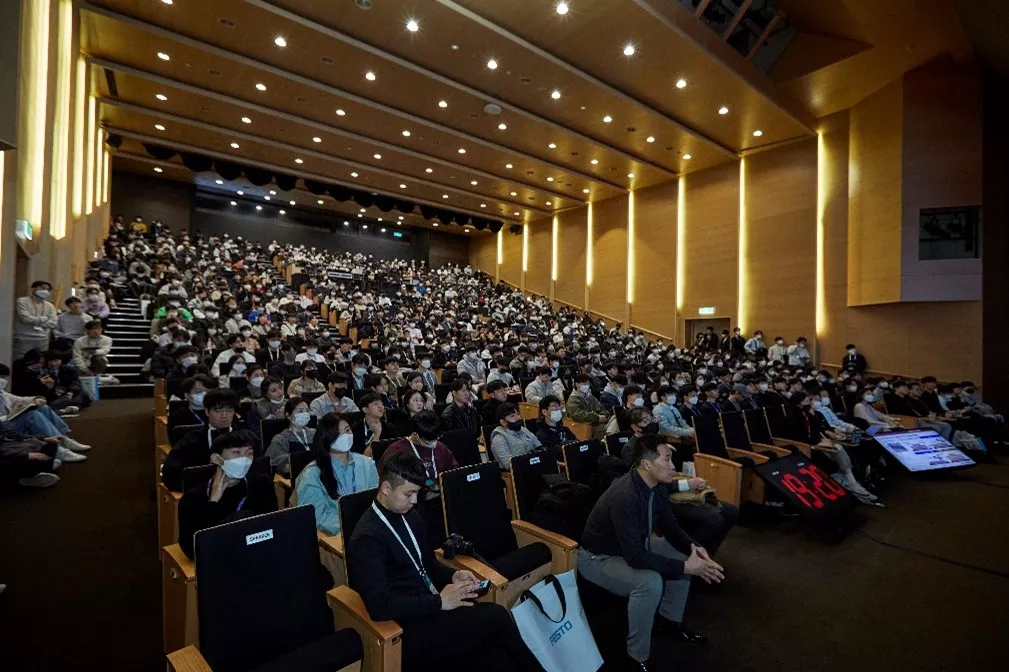
Meet the Experts! at SEMICON Korea 2023
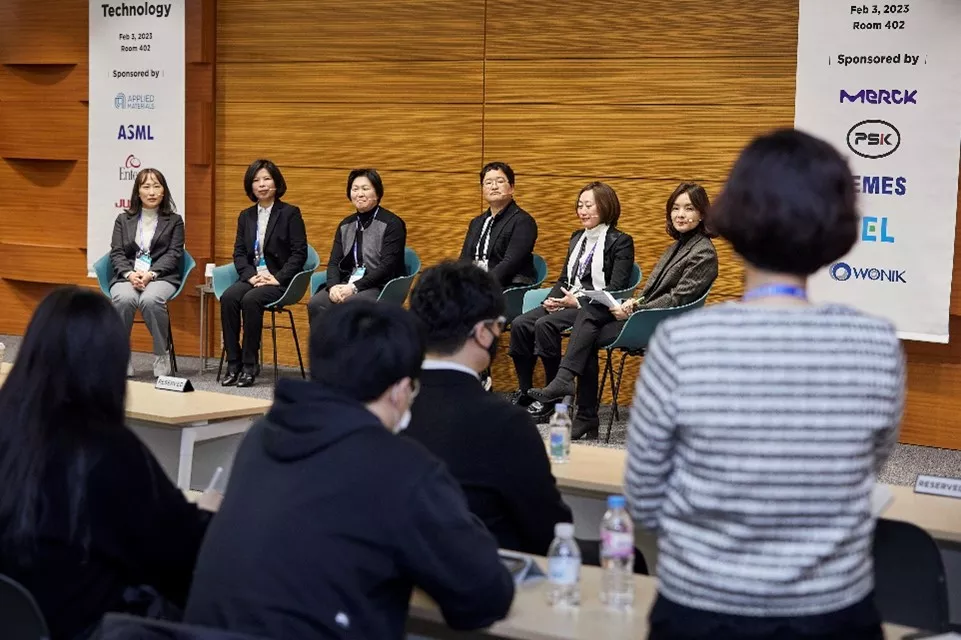
Women-In-Technology panelists (left to right): Hyunjoung Kwon, Field Process Engineer, Lam Research; EunSoon Chung, Korea DE Leader, DuPont; Wan Jae Park, Project Leader, SEMES; Yun-young Lee, Group Leader, PSK; Yang Hyong Kim, Country President, KLA Korea
Korea’s Largest Mentoring Program
During the university summer vacation (July-August), SEMI staged Campus Outreach, the largest mentoring program in Korea. Over two weeks, representatives from 15 companies mentored more than 6,100 students. The event featured an online session focusing on various university majors to educate prospective engineers about jobs in those fields as speakers shared their own career paths. Afterwards, human resources teams from each company offered offline mentoring sessions that also included overviews of the organizations and details on company benefits and hiring.
Campus Outreach
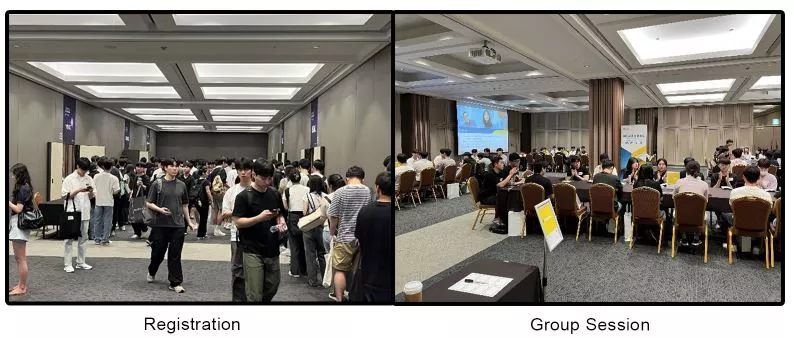
Tutorials Improve Technology Skills
Semiconductor Process Tutorial, held twice a year, consists of basic and intermediate course in the semiconductor manufacturing process. The basic course is designed for students and employees just entering the semiconductor industry, providing a high-level overview, while the intermediate course, led by experts from chipmakers and academia, covers the semiconductor manufacturing process in depth. Drawing 450 students, the course was conducted offline in the first half of 2023 and online in the second half to provide greater accessibility to students from various regions.
SEMI Korea also offered tutorial training on packaging and testing technology for junior engineers in the back-end field to help them quickly improve their skills and vie for higher-level roles. Distinguished engineers from leading companies in each field lead the training, educating the workers on manufacturing processes and technology roadmaps.
SEMI Helps Students Gain Hands-On Experience
SEMI gives university students the opportunity to experience not only the theory but also hands-on experience of the semiconductor manufacturing process. In 2023 SEMI Korea signed an MOU with Myongji University to deliver as many as 10 hands-on training sessions each year. The program is quickly emerging as the most popular program for students wishing to pursue a career in the semiconductor industry. One reason: The training is affordable to many students thanks to sponsorships by Applied Materials, ASM, ASML, Entegris, Jusung Engineering, KLA, Lam Research, Merck, PSK, SEMES, TEL, Woinik IPS and YIKC.
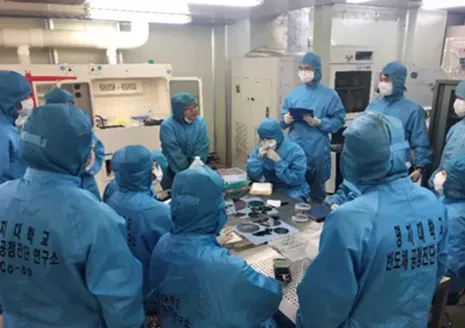
Hands-on training at the Fab of Myongji University
Student Ambassadors Raise Awareness of Smaller Semiconductor Ecosystem Companies
Semiconductor companies such as Samsung Electronics and SK hynix are familiar names to the many students looking to launch semiconductor industry careers with one of these powerhouses. Yet, university students may know little about the many smaller players across the semiconductor supply chain and career opportunities at these companies.
To help bridge that gap, SEMI Korea enlists university students majoring in STEM as ambassadors to introduce peers to smaller companies. This year, 16 student ambassadors shared the latest market information and technology trends on semiconductor equipment and materials with peers through social media. What’s more, the ambassadors are interviewing representatives as many as 10 semiconductor companies. Their goal: Educate fellow students about these organizations and pique their interest in pursuing careers there.
Korea’s rich ecosystem of parts, materials and equipment suppliers, chipmakers and other semiconductor players makes it a vital semiconductor manufacturing center – and a region where talent in various fields can flourish. SEMI Korea will continue to do its part to help nurture talent so that the workers, and their employers, can reach their full potential.
Jaegwan Shim is a Marketing Specialist at SEMI Korea.